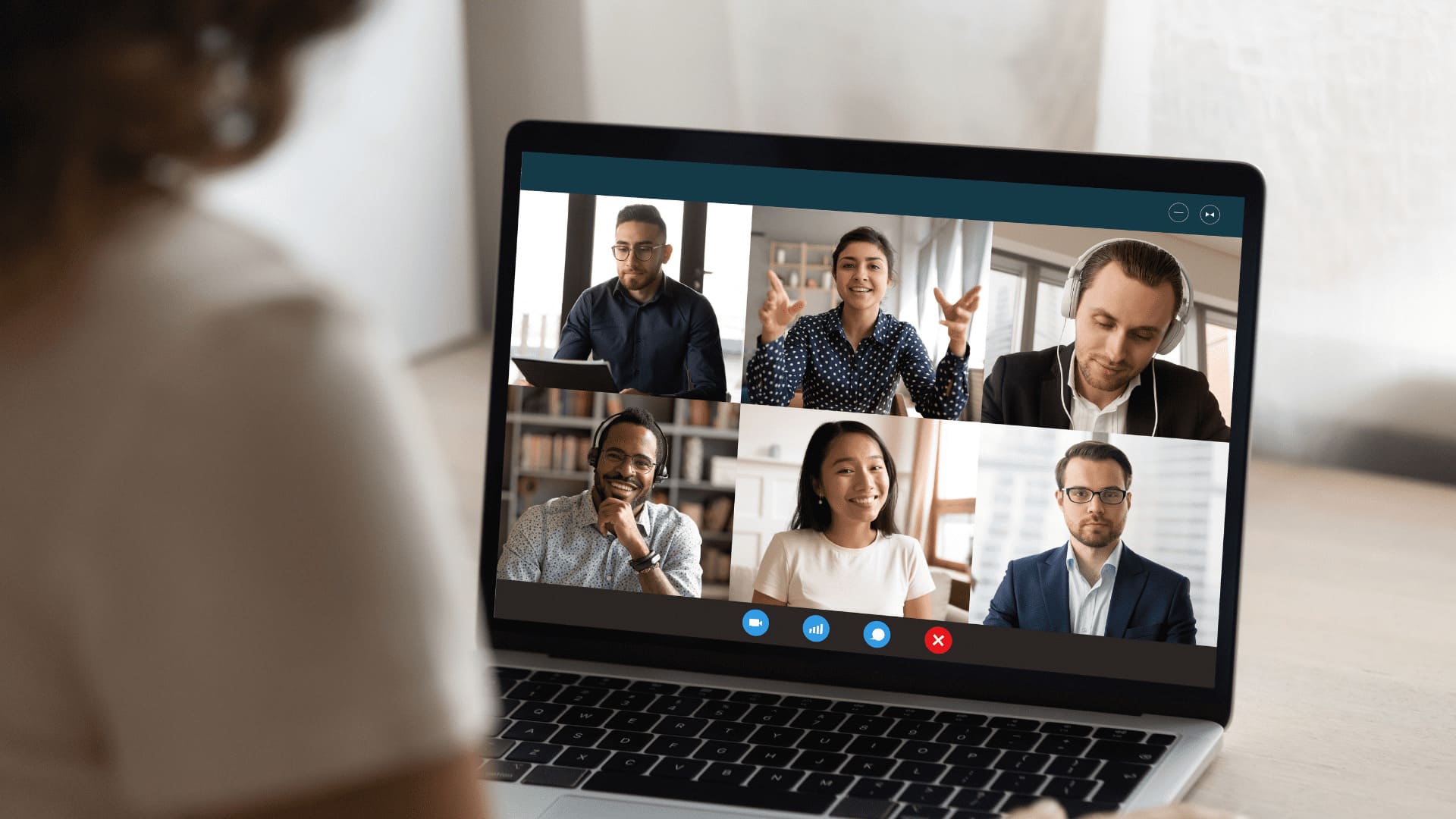Inhalt

The business world is constantly evolving, and global connections are becoming increasingly important. Companies need to find new ways to engage with clients and partners, both near and far. Digital events offer endless possibilities, revolutionizing how businesses network, share knowledge, and showcase their products.
In this blog, we provide an overview of the digital events space and explore why they are so valuable for businesses. We’ll examine the different types of digital events, discuss their advantages and challenges, and offer practical tips along with an event checklist to ensure your event’s success.
Let’s go!
What is a digital event?
A digital event takes place online and reaches its participants via the internet.
While webinars and online seminars have been around for many years, advancements in technology and shifts in consumer behavior have made digital events increasingly popular. They now stand as a serious alternative to traditional in-person gatherings.
Advantages of Digital Events
Digital events offer a range of advantages that make them an appealing option:
1. Larger Audience

The biggest advantage of digital events is their ability to reach a broader audience. Physical events can face challenges related to geographic location or travel restrictions, which may hinder participation. Digital events eliminate these barriers, allowing people from around the world to attend. This is particularly beneficial for niche markets or global companies working with a widely spread audience.
2. Cost efficient

A digital event can result in major cost savings compared to a physical event. There are no or minimal expenses for venues, catering, travel, and accommodation. Digital events can reduce production costs because they typically require less staff and equipment.
3. Flexibility and Comfort

Digital events offer greater flexibility and convenience for both organizers and participants. Since they are held online, they can be scheduled at times that suit participants regardless of their location. Moreover, digital events provide a more convenient experience, allowing attendees to participate from home or while on the go. This flexibility can lead to higher attendance rates and an enhanced user experience.
4. Data and Analysis

Digital events provide a wealth of data that can be invaluable to businesses. From page views and session durations to survey responses, this data offers a detailed picture of the event’s performance. Additionally, real-time analysis allows for immediate adjustments to enhance the overall experience.
5. Scalability
Digital events are easier to scale than physical events. Participant capacity is not limited by the size of a venue or the number of available seats. Additionally, digital events can easily be adapted to meet the needs of the business, whether by incorporating new features or tailoring content for different target audiences.
6. Sustainability
Digital events are more environmentally friendly than physical gatherings. With no need for travel, emissions from transportation such as cars or airplanes are avoided. Additionally, resource consumption at the venue—climate control, technical equipment, catering, or printed materials—is eliminated.
Types of digital events
There are various types of digital events, each with its own unique features and benefits.
Here are some of the most common formats:
1. Webinar

Webinars are among the most popular digital event formats. They are online seminars or presentations delivered over the internet. Webinars can be interactive, allowing participants to ask questions and engage in discussions. This format is ideal for delivering expert knowledge, showcasing products, or presenting case studies.
2. Virtual Conferences
Virtual conferences replicate the experience of a physical conference. They typically feature multiple sessions or presentations spread over an extended period and can attract thousands of participants. Virtual conferences may include keynote speeches, workshops, networking opportunities, and even virtual exhibition spaces.
3. Online Summits
Online summits are similar to virtual conferences but usually focus on a specific topic or industry and target a more specialized area of expertise. They provide an intensive learning experience and often encourage interaction and the exchange of ideas among participants.
4. Digital Roundtables
Digital roundtables are online meetings designed to facilitate discussions among a small group of participants. They provide an excellent platform for exchanging ideas, solving problems, or discussing current trends within a specific industry. Digital roundtables can offer an informal and interactive way to build valuable connections within a community.
5. Events with VR- and AR-Technology

Advancements in virtual reality (VR) and augmented reality (AR) technologies are creating exciting new opportunities for digital events. These technologies provide participants with interactive and immersive experiences. From virtual product showcases to games and simulations, VR and AR events can offer high levels of engagement and memorable experiences.
Best Practices for successful digital events
To ensure that your digital event is a success, you should follow these best practices:
1. Define clear goals

Start by defining clear goals for your event. What do you want to achieve? Are you looking to increase brand awareness, generate leads, or showcase expertise? Clear goals will guide the design of your event and help you set the right metrics for measuring success.
2. Choose the right format
Choose a digital event format that aligns with your goals and target audience. Consider the type of content you want to present and the level of interaction and engagement you desire. For example, webinars are excellent for educational content, while virtual conferences are better suited for networking and idea exchange.
3. Create valuable content

Content is key to a successful digital event. Ensure that your content is relevant, engaging, and valuable. Provide practical insights, case studies, or exclusive information that can’t be found elsewhere. Also, consider incorporating various types of content, such as videos, infographics, and interactive elements, to boost engagement.
4. Encourage interaction
Interaction and engagement are crucial for captivating your audience. To enhance these elements in digital events, consider incorporating features like QA sessions, polls, chats, or breakout rooms. These interactive components help participants engage more deeply with the content and connect with others.
5. Pick the right technology
Choosing the right technology platform is crucial for the success of your digital event. There are various platforms available, ranging from webinar software to comprehensive virtual event solutions. Select a platform that fits your needs and offers features such as streaming, chat, analytics, and potentially even VR or AR support. Thoroughly test the platform in advance to ensure it meets your requirements and functions smoothly.
6. Pay attention to the attendee journey
Consider the entire participant experience, from registration to post-event follow-up. Send clear instructions before the event and ensure everyone is aware of the technical requirements. During the event, provide a seamless user experience with easy navigation and technical support. After the event, maintain engagement by sharing relevant content, surveys, and offers to sustain relationships.
7. Promote networking and community-building

Networking is a crucial element of B2B events, and it can be effectively achieved in a digital platform. Many digital event platforms offer networking features such as chat options, virtual lounges, and even AI-powered matchmaking. Encourage participants to complete their profiles and connect with others, and provide opportunities for informal conversations and idea exchange to enhance engagement.
8. Measure and optimize
Leverage the data and analytics provided by digital events to measure and optimize performance. Monitor real-time metrics during the event, such as participant numbers, engagement rates, and feedback, and make adjustments as needed. After the event, analyze the results to gain insights for future events, and use the data to qualify and nurture leads.
Challenges of hosting digital events

While digital events offer numerous advantages, there are also several challenges to consider:
1. Technology Issues

Technological problems are a common concern for digital events. These include issues with internet connections, software glitches, or device compatibility. It’s important to choose a robust technology platform and conduct thorough testing before the event. Provide technical support during the event to quickly address any problems that arise.
2. Participant engagement
Maintaining engagement can be challenging, especially during longer digital events. To address this, ensure that your content is engaging and relevant, and incorporate various interactive elements. Consider ways to excite participants, like featuring surprise guests.
3. Time zone differences

Managing time differences can be challenging with a global audience. Try to find a time that works for the majority of your target audience and provide recorded sessions for those who cannot attend live. You might also consider spreading your event over multiple days or sessions to accommodate a broader range of participants.
4. Distractions
Because digital events take place online, participants can easily get distracted by other things, such as emails, social media, or other browser tabs. To mitigate this, keep your content interesting and interactive, and ensure that your speakers are dynamic and engaging. Send materials and an agenda ahead of the event so that participants can prepare and maximize their engagement.
Event-Checklist

To ensure that your digital event runs smoothly, it is essential to conduct thorough event planning and preparation.
Here is an event checklist that you can use as a guide:
- Define your goals and target audience.
- Choose a date and time that works for your global audience.
- Choose a robust and user-friendly digital event platform.
- Create valuable and interesting content, including different media formats.
- Promote interaction through QA, surveys and chats.
- Send clear instructions and technical requirements to participants before the event.
- Provide technical support during the event.
- Encourage networking and community-building through chat functions, virtual lounges, or AI-driven matchmaking.
- Measure and analyze the performance of the event using the data and analytics from the digital event platform.
- Maintain relationships after the event by providing relevant content, surveys, and offers.
Review this event checklist to ensure that all aspects of your digital event are covered and that you organize a successful and memorable event.
Summary

Digital events are a powerful and flexible way for companies to reach and engage their audience. They offer unique advantages, including a broader audience, cost efficiency, flexibility, and data insights. Through careful event planning, companies can leverage digital events to achieve their goals and make a lasting impact on their target audience.
Remember to follow the best practices and checklist to address challenges directly.
Good luck!


